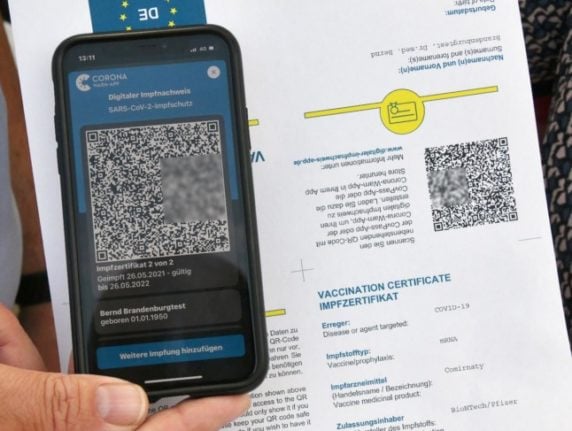The Associations of German Pharmacies (Apothekerverbände) said that, due to organisational reasons, not every pharmacy will initially be able to provide a certificate in the form of a QR code which can be uploaded into an app.
They advised people to check the website mein-apothekenmanager.de to see which chemists issue a certificate.
READ ALSO:
- What is Germany’s new digital ‘CovPass’ and how can I get it?
- German pharmacies to start offering digital vaccine certificates
The digital certificate is a voluntary addition to the yellow paper vaccination booklet, which is still valid.
The new digital initiative is part of an EU-wide project aimed at making it easier for residents in the bloc countries to prove vaccinations, negative Covid-19 tests and recovery from an infection.
The new certificate can be used as proof when virus restrictions are relaxed and will facilitate travel in Europe during the summer holiday season.
How will the certificate be used?
The proof will be stored in a QR code comprised of black and white squares, which in the future will be handed out following the second vaccination at the vaccination centre or at the doctor’s office where people get their jab. The code can then be scanned and presented using certain cell phone apps.
In addition to the CovPass app and the German government’s Corona-Warning-App, proof will also be possible via the Luca app from Wednesday, it emerged.
READ ALSO: Reader question: Where can I get Germany’s ‘yellow vaccination booklet’ and do I need it?
After a test phase, vaccination centres, doctors’ offices and pharmacies will now gradually join in, according to the Health Ministry.
The National Association of Statutory Health Insurance Physicians said that there will not be an immediate nationwide launch in GP practices for technical reasons.
State by state differences
Around 20 million people have been fully vaccinated against Covid in Germany. Yet how they can receive the digital certificate varies depending on where they live.
READ ALSO: Major milestone: More than 40 million Germans vaccinated against Covid
In Bavaria and Saxony-Anhalt, for example, people who have already received their jabs in vaccination centres are to be given access to the certificate via specially set-up websites.
In Baden-Württemberg, vaccination certificates are to be sent by post retrospectively over the course of the next few weeks, according to the state’s Ministry of Health.
In Thuringia, on the other hand, the Association of Statutory Health Insurance Physicians clarified on Friday that a subsequent issuance of the digital vaccination certificate for those who have already been vaccinated is not possible in the vaccination centres because the effort would not be manageable.
In North Rhine-Westphalia, the Associations of Statutory Health Insurance Physician also stated that electronic vaccination certificates could not yet be issued in doctors’ offices and vaccination centres for the time being.



 Please whitelist us to continue reading.
Please whitelist us to continue reading.
Will they take our US CDC cards? We were vaccinated on US military bases in Germany and therefore, got the US cards.